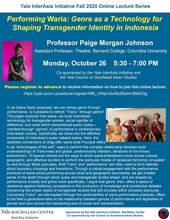If, as Diana Taylor proposed, we can remap genre through performance, is it possible to rethink “Trans-“ through genre? This paper explores how waria- as local Indonesian terminology for transgender women, social signifier of difference, and node within transnational queer codes—manifest through “genres” of performance in contemporary Indonesian society. Specifically we move into the affective economies of Indonesia’s queer cabaret scene. Here, the aesthetic conventions of drag offer waria what Foucault refers to as “technologies of the self”, ways to perform the complex relationship between local understandings of Trans-ness and global, predominantly Western, iterations of non-binary embodiment. Of special interest are the ways in which waria-entertainers move across cultural, geographic, and affective borders to perform the particular modes of racialized femininity circulated by and through Black pop-stars. Both Trans* and “performance” are often used to think laterally about boundary crossings and transitions. Through a critical engagement with the performance practices of waria artists performing across racial and geographic boundaries, we get a better sense of the depth through which queer and transgender bodies shape, and are shaped by, performance broadly and genre more specifically. I argue that genre, then, offers a space of resistance against totalizing conceptions in the production of knowledge and constitutive debates concerning the proper object of transgender studies that still circulate within scholarly discourse. Conversely Trans*, as interrogated through the particularities of waria performance practices, offers to the field a generative take on the relationship between genres of performance and legibilities of gender and race across the intersecting axis of power and representation.

